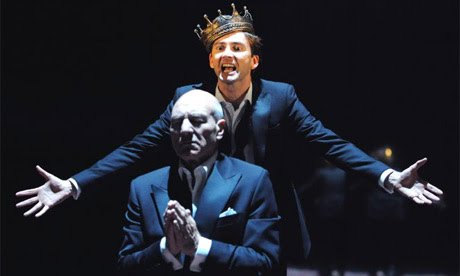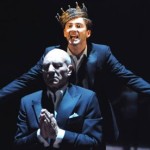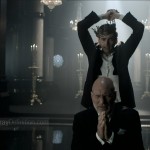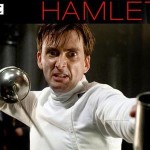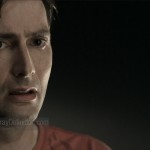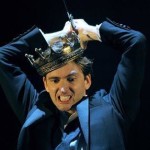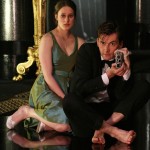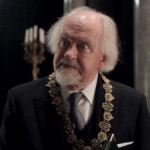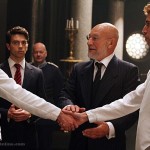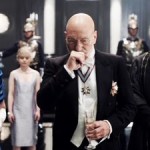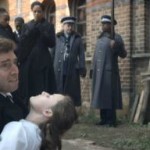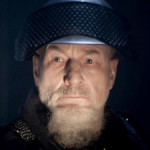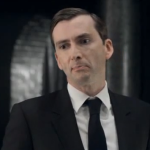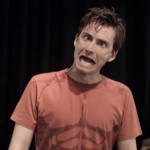“Oh, what a noble mind is here o’erthrown!” – Ophelia
Making a movie of the Bard’s most famous play is always going to be a tricky business, not least because of the many versions preceding you to the screen. Many regard Olivier‘s as the definitive screen Dane, though in the course of researching my own stage appearance as Hamlet I watched versions by many actors, including Kenneth Branagh, Kevin Kline, Rory Kinnear (at the Odeon, Chelmsford, beamed in live from the National), Nicol Williamson, amongst others. I also once saw Daniel Day Lewis play the role at the National in a performance that apparently took him to the brink of madness.
Greg Doran‘s RSC Hamlet, an adaptation of his acclaimed 2008 stage production, appears with David Tennant (né MacDonald), a likeable Scottish actor famed and feted by many for his stint as the Doctor, in the eponymous role. Tennant had, when he attempted the role, the weight of historical expectation on his slim young shoulders, of which more anon.
The first thing you notice about Doran’s exquisitely photographed Hamlet is that it is housed in a defunct Jesuit college, made over with a glossy mirror-shine black floor, antique framed mirrors, drapes, and candles to complement its period features, columns and windows. It has a claustrophobic air, though for the grave digging and funeral scenes the action does go outdoors, the ramparts for the ghost scenes being conducted in the cloisters. Furniture is minimal, but what there is seems fitting to the building.
It is a modern dress version, a common device though in this case there is no notably theme or unifying factor. The play could be set anywhere at any time; it seems the Danish court is independent of time and space, floating somewhere out in the milky way. Uniforms, DJs, the occasional suit, and fencing gear apart, it is also a deceptively informal Elsinore. Rosencranz and Guildernstern look almost slovenly, one in a tweed jacket and open-necked shirt, the other in a leather jacket, though this does not prevent the besuited Claudius from sending them on a mission to spy on their erstwhile friend Hamlet. For that matter, Horatio’s cord jacket has leather patches, giving him the look of a harassed suburban English teacher, and Hamlet himself appears in jeans and a coral-coloured t-shirt bearing the form of a 6-pack torso, perhaps hinting that he wants to be something he is not.
Talking of spying… “Denmark is a prison,” says Hamlet, mirroring Marcellus’s comment that “something is rotten in the state of Denmark” – and in this respect neither is wrong, for this Elsinore looks like a police state, being equipped with closed-circuit TV surveillance cameras. Small wonder Hamlet is guarded, almost furtive until he rips out a camera in order to gain his privacy. The arras behind which Claudius and Polonius hide during his nunnery scene with Ophelia is a two-way mirror, but then in the fishmonger scene he looks at it very suspiciously. This Hamlet is rightly paranoid: they are out to get him!
The sense of being watched helps to notch up the atmosphere of menace in Elsinore. Yes, there is the threat of a Norwegian invasion by young Fortinbras, but there is much else that is rotten within the castle even without foreign interference. At times the court of Claudius feels like Shaw’s The Apple Cart, in which the frothy dinner table discussion disguises a deeper sense of danger. The courtiers go about their business with a light tone but a subtext of fear, in which the camera colludes. Sometimes it eavesdrops, but most often it is a confidante, witness to the innermost thoughts and feelings of Prince Hamlet and King Claudius in particular. Hamlet turns the tables in the play-within-a-play scene, training a camcorder on the much distemper’d face of the King as the players play something like the murder of his father before his uncle. The King is not amused.
Against this backdrop the drama is played out by a fine cast, led by Tennant, Patrick Stewart, Penny Downie, Mariah Gale, Edward Bennett and Oliver Ford Davies, but there is a vibrancy, something of an urgency about the acting. I put this down to Doran’s production values: the whole venture is crisp and accessible, judiciously but not excessively cut. It is a Hamlet for the masses: every meaning is communicated through words and actions with a precision and clarity seen in a few but by no means all Shakespearian productions. The beauty and elegance of Shakespeare’s language is tuned for the modern ear through a fine interpretation, the words spoken as if in the modern idiom while retaining their historical integrity.
Hamlet has its comic moments (notably but not exclusively the gravedigger scene, with Mark Hadfield playing up the mirth the first gravedigger in a manner reminiscent of George Formby, minus ukelele but with shovel), but in this production it mostly flows like part psychological thriller, part kitchen sink drama. There is pace and intrigue added to the action, but never at the expense of the “words, words, words.”
Setting the scene is the new King. Stewart’s Claudius is smooth and suave, though when he is alone the cracks in his persona, the guilt for the murder of his brother King Hamlet and for his treatment of young Hamlet, are etched on his face. As per tradition, he also plays the tight-lipped ghost, thirsting for revenge of his murder and speaking of the horrors that befall him when not walking the night in a voice dripping with tragedy. With these chilling words starts the tragic quest and dilemma of Hamlet. Small wonder the Prince vows to “revenge his foul and most unnatural murder”:
“If thou hast nature in thee, bear it not;
Let not the royal bed of Denmark be
A couch for luxury and damned incest.
But, howsoever thou pursuest this act,
Taint not thy mind, nor let thy soul contrive
Against thy mother aught: leave her to heaven
And to those thorns that in her bosom lodge,
To prick and sting her. Fare thee well at once!
The glow-worm shows the matin to be near,
And ‘gins to pale his uneffectual fire:
Adieu, adieu, adieu! Remember me.”
It is a noble, mature performance, no less than you would expect from a leading dramatic knight. Stewart’s finest moment comes in Claudius’s monologue, the words “O, my offence is rank, it smells to heaven” spoken with a trembling intensity of feeling. His words fly up to heaven, but never can he reconcile with his own conscience the sin he has committed.
Downie’s Gertrude comes to life in the coruscating bedroom scene, drinking and smoking in her stress that there will unquestionably be a confrontation between mother and son, but one more traumatic than ever she could have realised. “Hamlet, thou have cleft my heart in twain,” she says as he rants on about her sins in marrying with indecent haste her husband’s brother and his killer, her face wracked with bitter pain, her eyes with hot tears. The killing of Polonius (by gun rather than the more traditional sword) shocks her, but nothing like as much as the attack on her by her son for marrying his murderous uncle. This is drama at its most fiery, and Downie does the Queen full justice.
I am particularly impressed by Davies’s excellent Polonius, a pompous bore and buffoon. “Do not mock him” says Hamlet to the Player King (the excellent veteran actor John Woodvine), though he himself does much mocking. However, for all the verbose and self-important nonsense spoken by Polonius, he has wormed his way to becoming the senior advisor to the King, and is more than capable of giving short shrift to underlings (though Reynaldo itches to escape from the most tedious of lectures, and eventually succeeds!)
His lectures to Laertes and Ophelia (Bennett and Gale) are equally dull, but dutifully they listen to his advice. But after his unplanned death both ultimately follow their own path to destiny, both take their own course. Ophelia, the woman who loves Hamlet but is thwarted by his act of madness “and to a nunnery go“, descends in turn from grief into madness in emotional song is conducted with pathos before the uncomprehending King and Queen, but the hot-headed Laertes, almost a doppelgänger for Sonny in The Godfather, is aided by Claudius in his quest to kill Hamlet in a rage for the deaths of his father and sister. Cue tragic ending as his words are spoken: “The devil take thy soul!”
But what of David Tennant? In the full script, Hamlet has 1,459 lines. It is a huge role, not one to be attempted without very serious study and excess stamina. It is a hugely demanding part, physically and mentally; the Dane is on screen for the vast majority of the play, in dialogue and voicing his internal debate in the form of soliloquies. Tennant attacks the with even greater passion and intensity than his colleagues, demonstrating the stamina required for the great roles, mind, body and soul.
After his first scene, berated by Claudius for excessive mourning, he acts with his whole body, he falls to his knees, wracked with pain for his first soliloquy: “O, that this too too solid flesh would melt, thaw and resolve itself into a dew!” You can feel the torment and suffering leaching out from his every pore as he curls into a foetal ball.
This is spectacular acting and fully deserving of every plaudit. Credit to Tennant, his Dane is both a model of clarity, richly entertaining at every level. “I’ll put an antic disposition on,” he says, and so he does, taking the piss out of Ophelia, Polonius, and Rosencrantz and Guildenstern in equal measure, while reserving his most caustic and vicious speeches for Claudius and his own mother, Gertrude.
Is he mad? See here for a discussion. I remain convinced that for all his verbal assault on himself (“Why, what an ass am I!”), Hamlet is never mad, but his demons are never far away. The self-torture for his lack of action, his purpose egged on by the ghost, is born of frustration and introspection. More to the point, he displays more than a few classic symptoms of depression, not least this much-remembered speech:
“I will tell you why. So shall my anticipation prevent your discovery, and your secrecy to the king and queen moult no feather. I have of late—but wherefore I know not—lost all my mirth, forgone all custom of exercises, and indeed it goes so heavily with my disposition that this goodly frame, the earth, seems to me a sterile promontory; this most excellent canopy, the air—look you, this brave o’erhanging firmament, this majestical roof fretted with golden fire—why, it appears no other thing to me than a foul and pestilent congregation of vapors.
“What a piece of work is a man! How noble in reason, how infinite in faculty! In form and moving how express and admirable! In action how like an angel, in apprehension how like a god! The beauty of the world. The paragon of animals. And yet, to me, what is this quintessence of dust? Man delights not me. No, nor woman neither, though by your smiling you seem to say so.”
He ponders death but his “To be or not to be…” does not strike you as a seriously suicidal intent so much as adolescent fantasies. “I have of late—but wherefore I know not—lost all my mirth, forgone all custom of exercises,” he tells R&G, hinting at depression, possibly the words truer than he knows. And yet his every thought and action is made with a knowing that this revenge will also destroy his own fabric. He could have murdered Claudius at prayer in cold blood, but holds back. The emotions ring true; they are raw and vividly portrayed.
“But I am pigeon-liver’d and lack gall
To make oppression bitter, or ere this I should have fatted all the region kites With this slave’s offal. Bloody, bawdy villain!Remorseless, treacherous, lecherous, kindless villain O, vengeance!”
This is not a classic Hamlet in the sense of focusing on the poetry of the speeches, but an impassioned, frustrated Prince, chained to Elsinore until liberated by the trip to England, where Claudius intends him to meet his death. He is an everyman in that he has the chance to do what we all wish we could do – take a chance to unleash our true feelings against our enemies.
That the stage is strewn with bodies at the end it is but an inevitability, the curse of fate. Perhaps Hamlet knew all along this was how he would die? But his father is avenged, and the two can go off for a drink and chat in the afterworld, leaving young Fortinbras to sort out Danish affairs and repopulate the deceased royal bloodline.
“Good night sweet prince And flights of angels sing thee to thy rest!”

